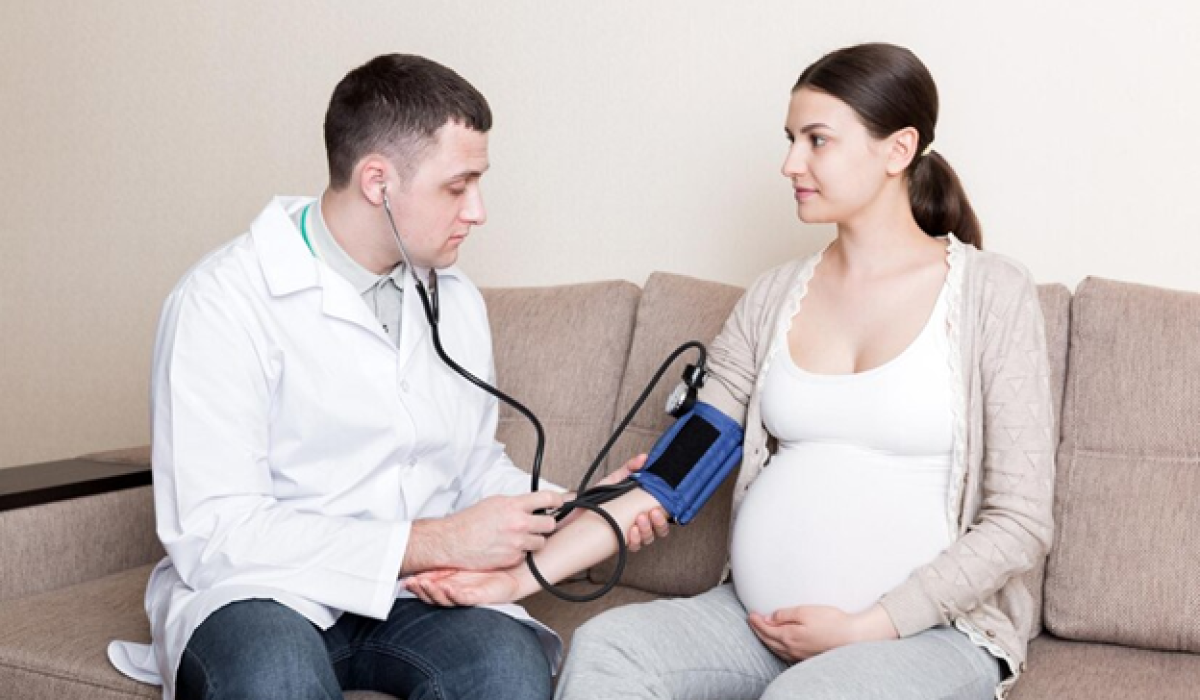What is Preeclampsia?
Preeclampsia is high blood pressure in pregnant women.
This condition occurs during pregnancy when there is a sudden increase in blood pressure. It can also cause clotting issues affecting organs like the liver and kidneys.
It usually develops late, i.e., after 20 weeks of pregnancy (third trimester). It can also develop in the initial stages of pregnancy (early-onset preeclampsia).
Preeclampsia is the most common complication in pregnancy.
It can also progress into a condition called eclampsia in some cases. Eclampsia is fatal, where people experience seizures and can also go into a coma.
Regular check-ups are essential for managing pregnancy-related complications.
Signs and Symptoms of Preeclampsia
A high blood pressure reading is the first sign of preeclampsia. It develops suddenly without you being aware of it. Symptoms include-
• Unusual swelling of face, hands, legs, and feet
• Persistent Headache
• Changes in vision (blurry vision or seeing spots)
• Pain in the upper abdomen
• Nausea and vomiting
• Sudden weight gain
• Difficulty breathing
Call your doctor immediately if you experience any of these symptoms, especially in the second half of pregnancy.
Causes of Preeclampsia
Although the exact cause is unknown, several factors may play a role. They include:
• Damage to the blood vessels
• Insufficient blood flow to the uterus
• Immune system problems
• Genetic factors
Risk Factors of Preeclampsia
High-risk factors of preeclampsia include:
• Preeclampsia in previous pregnancy
• Multiple pregnancy (twins, triplets, or more)
• Chronic hypertension
• Kidney disease
• Diabetes mellitus
• Autoimmune disorders
Moderate/low-risk factors of preeclampsia include:
• Obesity (body mass index over 30)
• Family history of preeclampsia
• Being age 35 or older
• Complications during previous pregnancies
• In vitro fertilization (IVF)
Diagnosing Preeclampsia
If the systolic pressure is 140 mm Hg or higher or the diastolic pressure is 90 mm Hg or higher, your doctor will confirm the diagnosis.
The doctor will also check your liver and kidneys functioning, along with blood and urine tests, fetal ultrasound, non-stress test, or biophysical profile (to check the baby’s heart rate and measure the baby’s breathing, movement, and volume of amniotic fluid in your uterus).
Treatment and Management of Preeclampsia
The goal of the treatment is to limit complications and deliver a healthy baby.
The primary treatment is to either deliver the baby (premature delivery) or manage the condition until the delivery, depending on the severity of the condition, the gestational age of the baby, and the overall health condition.
If preeclampsia is not severe, you may have frequent check-ups to monitor your blood pressure, symptoms, and baby’s health.
Your doctor will ask you to check your blood pressure daily at home and monitor your symptoms.
Severe preeclampsia requires a hospital stay to monitor your blood pressure, the growth and health of the baby, and other complications.
Medications to treat severe preeclampsia include:
· Antihypertensive
· Anticonvulsants
· Corticosteroids (to promote the development of the baby’s lungs before delivery)
Preeclampsia and Delivery: What to Expect?
Before Delivery
If your preeclampsia is not severe, your doctor may recommend delivery after 37 weeks. If it is severe, your doctor will recommend delivery before 37 weeks, depending on the severity of the condition.
The delivery (vaginal or cesarean) depends on the severity, gestational age of the baby, and other complications.
After delivery
Your doctor will monitor your blood pressure and other signs of preeclampsia after delivery. You need to monitor your blood pressure at home and consult your doctor if you have symptoms of postpartum preeclampsia (severe headaches, vision changes, severe abdominal pain, nausea, and vomiting).
Preventive Measures to Lower the Chance of Developing Preeclampsia
- Lose weight if you are obese prior to pregnancy
- Control your blood pressure and blood sugar levels (if you are diabetic or have high blood pressure before pregnancy)
- Practice regular exercise
- Get Enough Sleep
- Eat healthy foods low in salt
- Avoid caffeine, smoking, and alcohol
- Avoid stress
Your doctor may recommend low-dose aspirin if you have-
• Considerable risk of developing preeclampsia
• 2-3 Moderate risk factors of preeclampsia
Do not take aspirin on your own without consulting your doctor.
Question and Answers
Do You Need to Deliver Early If You Have Preeclampsia?
Early delivery may be recommended in some cases of women with preeclampsia to avoid complications for you and your baby.
Does Preeclampsia Affect Future Health?
Women who have preeclampsia may or may not affect their health in the future. Also, it increases the risk of having it again in future pregnancy.
What To Do If You Want to Get Pregnant but Have High Blood Pressure?
If you have high blood pressure consult your doctor before planning pregnancy to know if your-
- Blood pressure is under control
- Heart and kidneys are working well
- Your medications are safe to use
